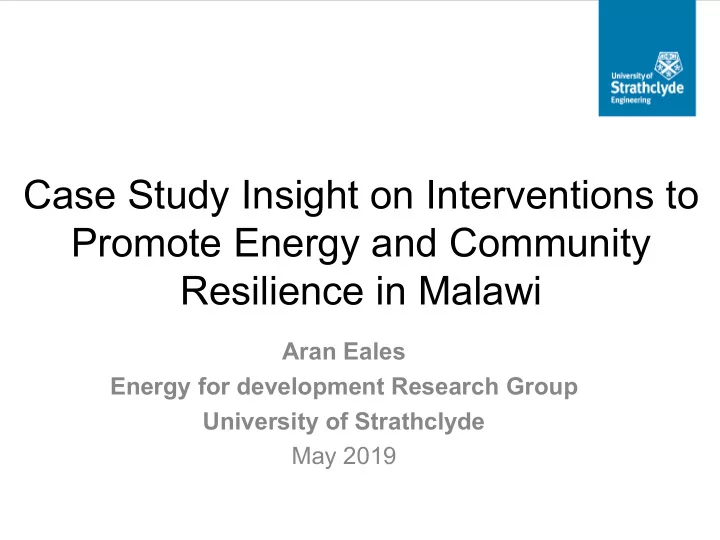

Case Study Insight on Interventions to Promote Energy and Community Resilience in Malawi Aran Eales Energy for development Research Group University of Strathclyde May 2019
Sustainable energy powers education and health systems, new businesses in previously unserved communities, jobs, manufacturing and industrialization, and water storage and food security.
Context: Energy Access in Malawi Access to national electricity grid • in Malawi is currently just 11% 13.6 million people live off-grid in • Malawi Lighting needs served by • 11% kerosene, candles and non- rechargeable batteries. 87% are still dependent on • biomass for cooking through the use of firewood Donor funded nationwide • initiatives to increase energy USAID, access in a low carbon manner 2017
Case Study Overview Policy: District Energy Officers Energy and Community Economic : Resilience Technical: Off Grid PV Asset Pay As You Go Management Business Energy Strategy
Government of Malawi Rural Electrification Strategy • Primary focus on grid extension • Energy demand exceeds supply, with deficit expected to increase exponentially • Community-based decentralised energy projects now a key development priority of the Government of Malawi energy policies
District Energy Officers (DEO) • The Government of Malawi implementing a DEO role to support energy sector decentralisation • Expected in all 28 Malawi districts by 2022 DEO activities Dissemination of Facilitate government policies community led Informer – a source energy projects Energy auditor of credible technical energy information Government facilitator Community facilitator Socio-economic Lead and manage impact assessment community led projects Identifying where appropriate promising Networker with other community sector councillors Energy education of projects local communities
Piloting District Energy Officers Background DEO pilot in 2 districts 2017 – 2022 • Government of Malawi support • Key Activities • Targeted energy training within existing district structure and extension workers • Record challenges faced by the communities on energy issues • Identify, support and develop promising community energy projects Insights • Energyscaping key for tracking and mapping community energy use • Information dissemination: Product Standards • Social Impact Quantification needed for government investment justification
Piloting DEO: Energyscaping Mapping existing and potential energy projects and demand • The use of mobile data collection effective way to capture and ‘heat map’ district energy activity • Targeting information dissemination to local and national government decision makers and allowing tracking of SDG7 progress.
Piloting DEO: Increased Awareness • Evidence that ‘energy awareness’ of community members and decision makers at the district level has significantly increased when compared to the pre- DEO era. • Increase in knowledge has unveiled a proliferation of sub-standard energy products in local markets, leading to calls for more regulations and standards for energy product quality control.
Asset Management of Decentralised PV Systems for Public Institutions • 2012-2015: Scottish Government funded Malawi Renewable Energy Acceleration Programme (MREAP) • Installation of 82 independent solar PV systems at schools, health and community centres. • Community Based Organisations (CBOs) set up to manage systems and generate revenue for maintenance by implementing Income Generating Activities (phone charging, refrigeration, barbershop) • In 2019 the positive social impact that these systems have generated is becoming clearer • …but in many cases revenue generation is insufficient to pay for the on-going maintenance of the solar systems.
Asset Management Strategy • Appointment of Asset Manager responsible for PV system group • Establish and maintain a centralised asset register. • Establish regular communication with local service technicians and agree monthly servicing plan to clean systems, collect maintenance fees and report any problems. • Determine an appropriate maintenance fee paid by the host site / client and the policy that will be adopted if payments are not made. • Consider remote monitoring strategy utilising either digital or human monitoring. £14,700 per year or £0.067/watt/month
Productive Uses of Solar PV: a mechanism for community resilience in Malawi? Challenges: • Up front costs • Maintenance • Component and Installation Quality
Pay As You Go Business Energy (PAYG-BE) • Local entrepreneurs receive a PUE PV system and agree to pay-back the cost of the system over a period of time. • Piloted in Dedza, logging electrical demand and income/expenditure • Business plan with financials model developed Product Deposit Loan Monthly Term Amount Payment (months) $63 $2,414 $49 Refrigeration 36 Barber & Phone 18 Charging $21 $605 $34 Shop Lighting $13 $227 $13 18 Irrigation $56 $2,268 $63 36 TV show $42 $1,837 $49 36 • Technical solutions for secure remote payments not available locally. • Financial sustainability of PAYG-BE programme achieved if current projects are deployed at scale (>100 installations).
Energy and Community Resilience • Lack of sustainable energy access reduces community resilience in Malawi • Case study data has highlighted where progress is being made and where key challenges lie: Effective government energy policy needs efficient • mechanisms for implementation Sustainability of energy systems requires robust economic • planning Technical innovation aids and accelerates energy • interventions • Multifaceted challenges present a wealth of opportunities for multidisciplinary research
Recommend
More recommend